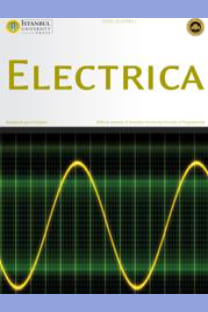A Fully Automatic Novel Method to Determine QT Interval Based on Continuous Wavelet Transform
A Fully Automatic Novel Method to Determine QT Interval Based on Continuous Wavelet Transform
ECG Signal, QT interval ECG signal classification, Pan-Tompkins Algorithm, Continuous Wavelet Transform,
___
- Goldberg, R. J., Bengtson, J., Chen, Z., Anderson, K. M., Locati, E., & Levy, D.,"Duration of the QT interval and total and cardiovascular mortality in healthy persons (The Framingham Heart Study experience)".,The American journal of cardiology, 67(1), 55-58.,1991
- Zhang, Q., Manriquez, A. I., Médigue, C., Papelier, Y., & Sorine, M.,“An algorithm for robust and efficient location of T-wave ends in electrocardiograms”,IEEE Transactions on Biomedical Engineering, 53(12), 2544-2552,2006.
- Goldenberg, I. L. A. N., Moss, A. J., & Zareba, W. QT interval: how to measure it and what is" normal". Journal of cardiovascular electrophysiology, 17(3), 333-336, (2006).
- Helfenbein, E. D., Zhou, S. H., Lindauer, J. M., Field, D. Q., Gregg, R. E., Wang, J. J., ... & Michaud, F. P. An algorithm for continuous real-time QT interval monitoring. Journal of electrocardiology, 39(4), S123-S127, (2006).
- Murray, A., McLaughlin, N. B., Bourke, J. P., Doig, J. C., Furniss, S. S., & Campbell, R. W.,“Errors in manual measurement of QT intervals”,British Heart Journal, 71(4), 386-390, (1994).
- McLaughlin, N. B., Campbell, R. W. F., & Murray, A.,“Accuracy of automatic QT measurement techniques”. Computers in Cardiology, Proceedings. 863-866. IEEE, 1993.
- Hayn, D., Kollmann, A., & Schreier, G.,“Automated QT interval measurement from multilead ECG signals”,Computers in Cardiology, 381-384, IEEE, 2006.
- Clifford, G. D., & Villarroel, M. C.,“Model-based determination of QT intervals”,Computers in Cardiology, 357-360, IEEE, 2006.
- Xue, Q., & Reddy, S. Algorithms for computerized QT analysis. Journal of electrocardiology, 30, 181-186. (1998).
- Alexander A. Suarez Leon et al, "Neural Network Approach for T wave End Detection: A comparison of Architectures", Comput. Cardiol., vol. 42, pp. 589-592, 2015.
- Mehmet İşcan; Cüneyt Yilmaz; Faruk Yi̇ği̇t, " T-wave end pattern classification based on Gaussian mixture model", DOI: 10.1109/SIU.2016.7496149, Pages 1953 - 1956, 2016.
- Mehmet İşcan, Faruk Yi̇ği̇t, Cüneyt Yilmaz," Heartbeat Pattern Classification Algorithm Based on Gaussian Mixture Model", Inter. Symp. on Med. Meas. and App., Italy,2016.
- Chesnokov, Y. C., Nerukh, D., & Glen, R. C.,“Individually adaptable automatic QT detector”. Computers in Cardiology,337-340, IEEE, 2006.
- Li, C., Zheng, C., & Tai, C. Detection of ECG characteristic points using wavelet transforms. IEEE Transactions on biomedical Engineering, 42(1), 21-28., (1995).
- Chudacek, V., Huptych, M., Novak, D., & Lhotska, L.. Automatic QT interval measurement using rule-based gradient method. In Computers in Cardiology, 2006 (pp. 349-351). IEEE, (2006, September)
- Laguna P. R. G. Mark, Goldberger A., Moody G. B., “A database for evaluation of algorithms for measurement of QT and other waveform intervals in the ECG”, Comput.in Card., 1997.
- Willems, J. L., Abreu-Lima, C., Arnaud, P., van Bemmel, J. H., Brohet, C., Degani, R., ... & Machado, H. The diagnostic performance of computer programs for the interpretation of electrocardiograms. New England Journal of Medicine, 325(25), 1767-1773., (1991).
- Jané, R., Blasi, A., García, J., & Laguna, P.. Evaluation of an automatic threshold based detector of waveform limits in Holter ECG with the QT database. In Computers in Cardiology 1997 (pp. 295-298). IEEE., (1997, September)
- Cesari, M., Mehlsen, J., Mehlsen, A. B., & Sorensen, H. B. D. Application of a new robust ECG T-wave delineation algorithm for the evaluation of the autonomic innervation of the myocardium. In Engineering in Medicine and Biology Society (EMBC), 2016 IEEE 38th Annual International Conference of the (pp. 3801-3804). IEEE, (2016, August).
- Madeiro, J. P., Nicolson, W. B., Cortez, P. C., Marques, J. A., Vázquez-Seisdedos, C. R., Elangovan, N., ... & Schlindwein, F. S. New approach for T-wave peak detection and T-wave end location in 12-lead paced ECG signals based on a mathematical model. Medical engineering & physics, 35(8), 1105-1115., (2013).
- Manriquez, A. I., Zhang, Q., Medigue, C., Papelier, Y., & Sorine, M. Multi-lead T wave end detection based on statistical hypothesis testing. IFAC Proceedings Volumes, 39(18), 93-98., (2006).
- Martínez, J. P., Almeida, R., Olmos, S., Rocha, A. P., & Laguna, P. A wavelet-based ECG delineator: evaluation on standard databases. IEEE Transactions on biomedical engineering, 51(4), 570-581., (2004).
- Vila, J. A., Gang, Y., Presedo, J. M. R., Fernández-Delgado, M., Barro, S., & Malik, M. A new approach for TU complex characterization. IEEE Transactions on Biomedical Engineering, 47(6), 764-772., (2000).
- ISSN: 2619-9831
- Yayın Aralığı: 3
- Başlangıç: 2001
- Yayıncı: İstanbul Üniversitesi-Cerrahpaşa
A Fully Automatic Novel Method to Determine QT Interval Based on Continuous Wavelet Transform
Cüneyt YILMAZ, Mehmet İŞCAN, Abdurrahman YILMAZ
Murat Erhan BALCI, Mehmet Hakan HOCAOGLU
Heart Sound Localization and Reduction in Tracheal Sounds by Gabor Time-Frequency Masking
SOLVING SUDOKU PUZZLE with NUMBERS RECOGNIZED by USING ARTIFICIAL NEURAL NETWORKS
Selcuk SEVGEN, Emel ARSLAN, Ruya SAMLI
Çiğdem Gülüzar Altıntop, Fatma Latifoğlu, Emre Çelikzencir, Gülten Can Sezgin, Mustafa Alper Yurci
SUPPORT VECTOR MACHINES COMBINED WITH FEATURE SELECTION FOR DIABETES DIAGNOSIS
Fatma Patlar AKBULUT, Aydın AKAN
A NOVEL REVERSIBLE FAULT TOLERANT MICROPROCESSOR DESIGN IN AMS 0.35UM PROCESS
M. Hüsrev CILASUN, Mustafa ALTUN
Assessment of Similarity Rates of Liver Images Using Geometric Transformations
Tuğba PALABAŞ TAPKIN, Onur OSMAN, Tuncer ERGİN, Uygar TEOMETE, Özgür DANDİN, Nizamettin AYDIN
